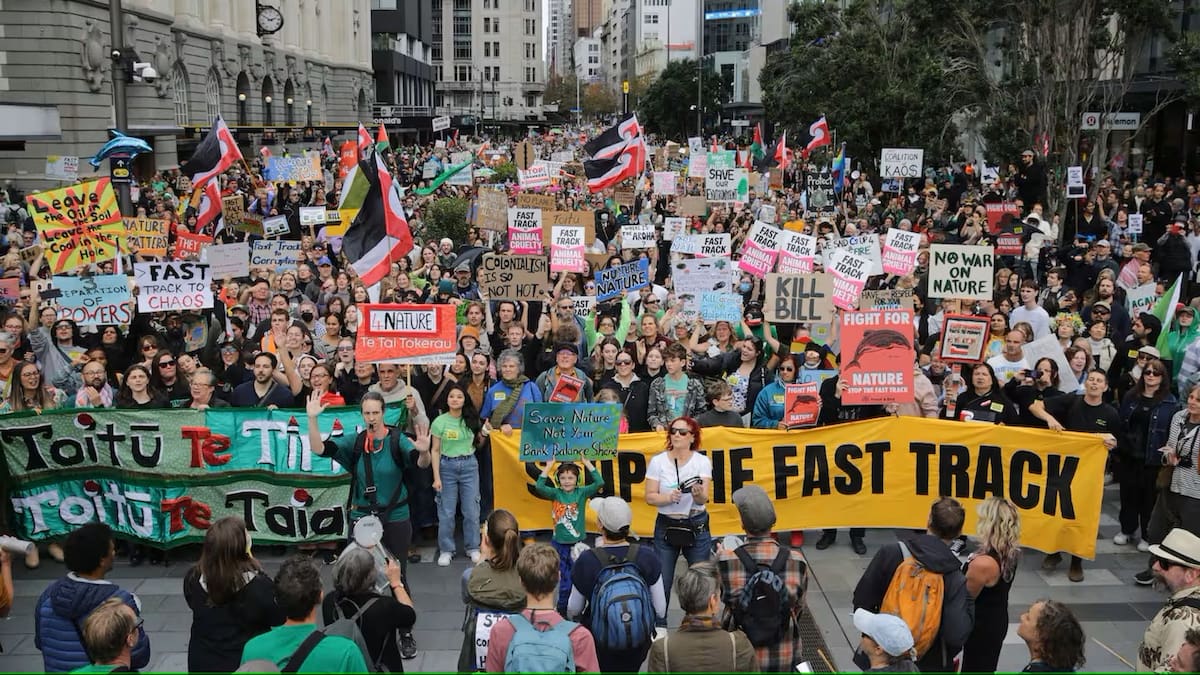Fast-track bill protesters in Auckland last weekend. Photo / Sylvie Whinray
Steven Joyce is a former National Party Minister of Finance and Minister of Transport. He is a director at Joyce Advisory and the author of the recently published book on his time in office, On
the Record.
OPINION
Watching the protests against the fast-track process and sundry other issues last weekend, I experienced a familiar sense of unreality.
A decade or so ago, similar types of protests were taking place in Northland. A vociferous group of locals was anti-mining, anti-irrigation, and against the expansion of tourism. The particular tourism example was Carrington Estate, north of Kaitāia, where the Chinese owner who bought the property because of his passion for New Zealand had the temerity to propose expanding the accommodation on site to make the property profitable. It would involve more jobs, training and so on, but some of the locals were having none of it.
Of course, that same group of protesters were offended at the perennially high unemployment rate that blights Northland. Almost in the same breath, they demanded the Government provide jobs for the region, completely failing to see the inherent contradiction in their demands. It’s very hard to employ people in rewarding and fulfilling jobs if you go around shaking your head at all the opportunities that come your way.
For Northland back then, read the whole country today.
We have just had six years of a Government and its supporters turning up their noses at nearly all the industries that have been this country’s primary sources of income over the decades.
They didn’t like farming, they didn’t like mining, they banned the oil and gas exploration industry, they were suspicious of forestry and fishing, they weren’t fans of aquaculture, and they were at best ambivalent to horticulture, as evidenced by their willingness to let fruit rot on the ground rather than bringing in workers to pick it.
But it was worse. One of the arguments advanced against extractive industries is that they tarnish New Zealand’s clean and green tourism image. Yet ministers were even ambivalent about tourism. Remember all the arguments about fewer but higher-value tourists that Minister Nash used to bang on about? Well, we certainly ended up with fewer. As for our fifth-largest export of the time, international education, they were about shrinking that too, even before it was conveniently decimated by Covid.
It was alarming, and even more so in hindsight. If you add in their dislike of the aluminium smelter in Invercargill, ministers had a negative view on pretty much all of New Zealand’s top dozen exports, and often too the overseas-based investors that provided the capital to them. Which is difficult when exports are the way we pay our way in the world.
It was much easier to make a shorter list of what that Government was in favour of, which was broadly the creative industries and the tech sector. Both excellent sectors, but the difficulty with the creative sector is that for the most part it doesn’t survive without taxpayer subsidies.
The film industry is notorious, but anything involving a video screen seems to be the same. Game developers used to successfully stand on their own feet, but one of the last acts of the previous administration was to give in to years of industry lobbying and create a subsidy for them too. From the country’s wealth perspective, we are not paying for our lifestyles with the creative sector any time soon.
The tech sector is more nuanced. It did require research and development subsidies to really get it going, but it is now standing on its own two feet, and our successful tech companies are spawning a new round of exciting startups. Tech is helping us pay our way in the world and we should all be proud of the progress made. But as a country, we won’t get wealthy on the tech sector alone, just the same as we’d have a much lower standard of living if we were dependent solely on agriculture. We need all our industries firing and growing to retain our status as a successful first-world country.
Which brings us back to last weekend’s protests. As much as they were ostensibly about the fast-track legislation and lifting the oil and gas exploration ban, they were mostly about stopping stuff the protesters don’t like the sound of.
And yet if you asked them what we should do instead, the things which would create the same or higher incomes for all of us, they would stare at you blankly. Either wilfully or ignorantly they don’t make the connection. The connection between how much we pay our teachers and doctors and what the country earns. The connection between their own wages and what the country earns. The connection between the number of people who head overseas to find their future, versus the strength of opportunities we provide them here.
The nadir of that unreality had to be the image of perennial protester Russel Norman reading his speech to the gathering from his expensive, imported, made-of-minerals smartphone. Supremely unaware of the irony, I understand Norman forgot to cover how we’d all afford our smartphones, or how they would even be constructed, if we followed his policy prescription.
By all means, debate the merits of the mechanisms of the fast-track bill. There are undoubtedly different ways of speeding up decision-making when it comes to new physical investments. I have long thought that the management of environmental effects should be separated from the planning decision about where and if something is built. These days most environmental effects can be successfully managed, without going to the extreme of saying a point-blank no to a development.
But that’s not what those in the anti-crowd are about. The fast-track bill and the repeal of the oil and gas ban are just convenient whipping boys. They don’t want any new developments at all and would close down much of what has been built if they had their way. These are extreme positions, and if we don’t reject them we stand to get much poorer, and much lonelier, as more and more people shift overseas.
There is a sensible middle ground in all of this. Nobody is talking about covering the place in concrete or developing everything everywhere. A trip in a plane tells you that whatever industrial development we have, it’s a tiny footprint on our landscape. And as we all know, it is in the farming sector’s interest to also protect our environment. They, after all, have to live off it.
We are at an inflection point. We can see from the last Budget that government spending can no longer hold up the sky. It has to be a commercial investment.
After the past six years many companies I know, some of whom I currently work with, see the present RMA (Resource Management Act) reforms as their last roll of the dice. If it all remains too hard, they may just invest elsewhere. After all, economic growth and prosperity remains a geographic play. It will always happen somewhere.
Progress is inexorable. The question for us is simple. How much of it do we want to have happen here? How wealthy, or poor, do we want to be?






